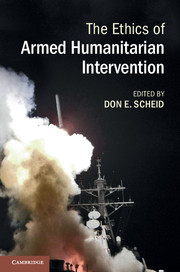Book contents
- Frontmatter
- Contents
- Notes on contributors
- Preface and acknowledgments
- List of abbreviations and acronyms
- Part I Intervention and debate
- Part II Moral perspectives
- Part III Ideas and reconsiderations
- 8 The costs of war
- 9 Armed humanitarian intervention and the problem of abuse after Libya
- 10 The responsibility to protect and the problem of regime change
- 11 Law, ethics, and the responsibility to protect
- 12 Responsibility to protect and the language of crimes
- 13 Post-intervention
- 14 Rethinking responsibility to protect
- Select bibliography
- Index
- References
13 - Post-intervention
Permissions and prohibitions
Published online by Cambridge University Press: 05 June 2014
- Frontmatter
- Contents
- Notes on contributors
- Preface and acknowledgments
- List of abbreviations and acronyms
- Part I Intervention and debate
- Part II Moral perspectives
- Part III Ideas and reconsiderations
- 8 The costs of war
- 9 Armed humanitarian intervention and the problem of abuse after Libya
- 10 The responsibility to protect and the problem of regime change
- 11 Law, ethics, and the responsibility to protect
- 12 Responsibility to protect and the language of crimes
- 13 Post-intervention
- 14 Rethinking responsibility to protect
- Select bibliography
- Index
- References
Summary
Almost always, with any kind of armed conflict, disproportionate attention gets showered on two major issues: (1) when (if ever) one should resort to war (jus ad bellum); and (2) how one should best fight that war, after it has begun (jus in bello). But a war, of course, has not only a beginning, and a middle, but also an end. What should one do at the end of armed conflict? How should nations conduct themselves during the termination phase of war (jus post bellum)?
Armed humanitarian intervention (AHI) is a kind of armed conflict, wherein the use of force is deemed necessary to protect innocent lives from severe violence, and/or slavery, and/or genocide, at the hands of a brutal, rights-violating regime. AHI is somewhat unique as a form of armed conflict because: (1) it involves moving forcefully into another country which has not committed international aggression; and (2) it is motivated, in the main, by the moral objective of saving lives (as opposed to various non-moral objectives, such as gaining control over natural resources). Thus, we profit to examine not only the conditions under which AHI is permissible, and how best to fight an AHI, after that original decision has been made, but further how best to bring an AHI to a successful end, to the benefit of as many people as possible. This is the main subject of this chapter: post-intervention justice.
Keywords
- Type
- Chapter
- Information
- The Ethics of Armed Humanitarian Intervention , pp. 224 - 242Publisher: Cambridge University PressPrint publication year: 2014
References
- 1
- Cited by



